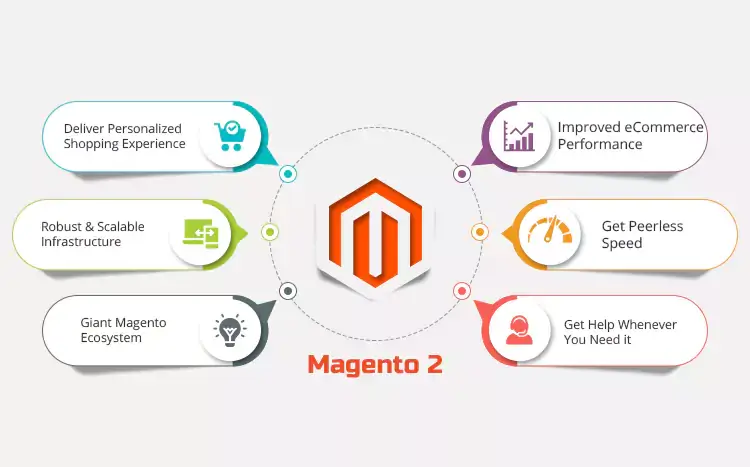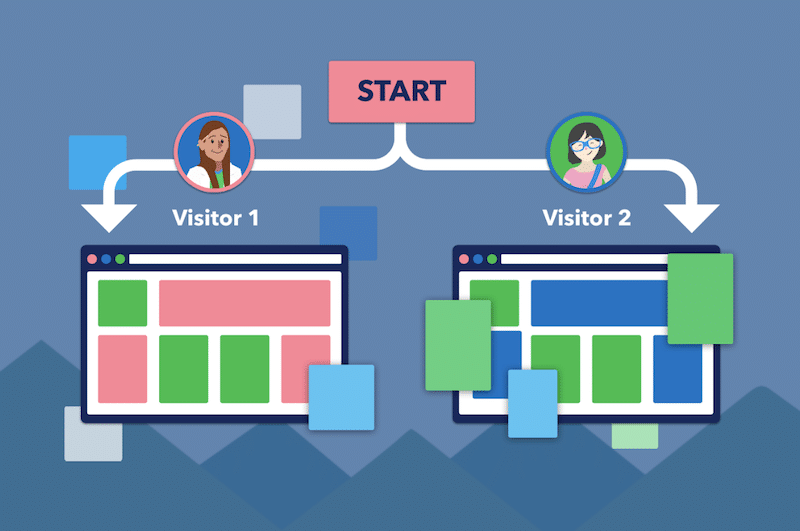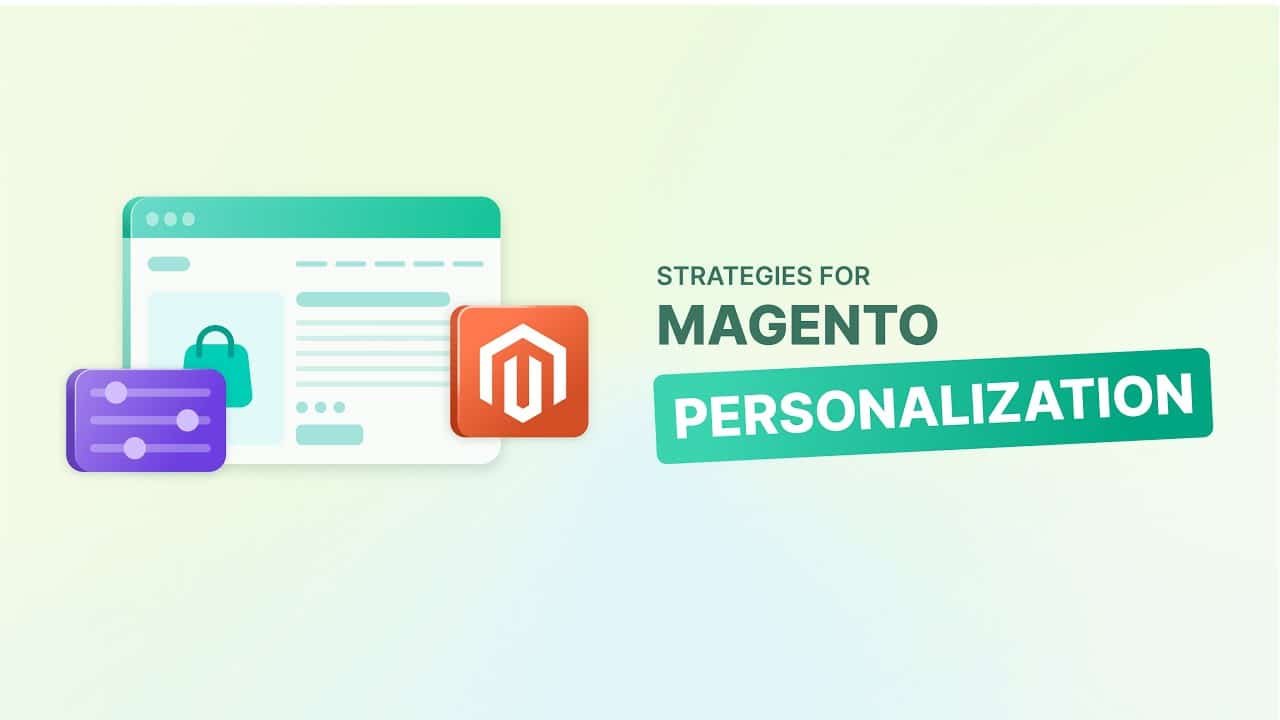As an eCommerce business owner, you should essentially focus on improving customer experience as it helps drive more sales.
Nowadays, people expect customized experiences to cater to their unique requirements and preferences. One of the best ways to achieve this is through personalization which is a highly effective strategy that can considerably impact customer satisfaction, loyalty, etc.
The best part about this is that it helps kickstart your overall sales volume. In this regard, you can opt for the best Magento development services. We will also discuss the impact of personalization on Magento. So, let’s get started with our discussion:
What is Magento?

Magento development for eCommerce is a flexible and robust platform that is extensively employed by businesses for the creation and management of online stores.
It offers a host of features that serve the specific requirements of both large enterprises and small businesses. So, if you have still not used this platform, it is the best time to go for Magento web development.
How Does It Differ from The Other E-Commerce Platforms?
Here are some of the major distinctions existing between Magento and other popular eCommerce platforms:
| Aspect | Magento | Shopify | WooCommerce | BigCommerce |
|---|---|---|---|---|
| Flexibility | Highly flexible and customizable. | Flexible but less customizable compared to Magento. | Moderate flexibility with customization options. | Offers flexibility but may have limitations. |
| Scalability | Highly scalable, suitable for large catalogs and traffic. | Scalable, but may require additional apps for growth. | Scalable, but performance can vary based on hosting. | Scalable with reliable cloud-based infrastructure. |
| Feature Set | Comprehensive feature set for rich shopping experiences. | Rich feature set with a user-friendly interface. | Basic features with extensive plugin options. | Robust feature set with built-in SEO capabilities. |
| Cost | Offers both free (Community) and paid (Commerce) options. | Subscription-based plans with transaction fees. | Free to use but may incur costs for plugins. | Subscription-based plans with various tiers. |
| Customization | Extensive customization options for unique stores. | Customizable, but customization may be limited. | Highly customizable with access to codebase. | Offers customization but with some constraints. |
| Community Support | Large and active community for support and resources. | Strong community with extensive resources. | Community-driven support with diverse plugins. | Active community with reliable support. |
| Security | Prioritizes security with regular updates and features. | Focuses on security with built-in protections. | Security measures may vary based on hosting. | Prioritizes security with advanced features. |
| Ease of Use | Complex interfaces may require technical knowledge. | User-friendly interface suitable for beginners. | User-friendly interface with a moderate learning curve. | Intuitive interface with the easy setup process. |
| Market Share | Among top platforms with a significant market presence. | Largest market share globally in e-commerce platforms. | Dominates WordPress-based e-commerce market share. | Recognized as one of the leading e-commerce platforms. |
| Popularity | Widely used by mid-size to large enterprises globally. | A popular choice for small to mid-size businesses. | A popular choice for WordPress users and smaller businesses. | Attracts businesses of all sizes with its robust features. |
What Is Known as Personalization?
Personalization refers to the specific practice that involves delivering tailored experiences to individual users depending on their preferences, behaviors, and demographics.
In this case, businesses should essentially make use of data analytics and technologies. So, with its aid, they can effortlessly craft tailored recommendations, content, and promotions that cater to the targeted group of audience and that too on a deeper level.
Why Personalization Plays a Key Role in E-commerce?

A Boost in Customer Engagement
Personalization is highly important in e-commerce as it helps to keep customers engaged with your brand. By offering personalized experiences, you would be able to easily capture the attention of customers. As a part of it, all that you need is to craft customized content.
You should also focus on delivering pertinent product recommendations. Thus, by adopting this particular approach, you would be able to boost conversion and increase the chances of repeat purchases.
Optimization of Marketing Efforts
One of the most important advantages of customization or personalization is that it lets you target your marketing endeavors in a more effective manner.
It typically involves delivering customized messages and segmenting your audience. With these specific strategies, you would be able to increase the effectiveness of your campaigns. Not only that, but it facilitates driving greater engagement and conversions.
Improvement in Customer Loyalty
As an eCommerce business owner, it becomes crucial for you to adopt strategies that help in boosting customer loyalty. Whenever customers feel understood and valued, they are more likely to remain loyal to your brand.
Not only that, but personalization facilitates building connection and trust. Eventually, it leads to long-term relationships with your audience.
Elevation in Conversion Rates
By presenting shoppers with products that align with their interests and preferences, you can reduce decision fatigue and friction in the purchasing process. As a result, this streamlined experience often results in higher conversion rates along with a boost in return on investment or ROI.
What Role Does Magento Play in Personalization?

Offers Personalization Features that are Powered by AI or Artificial Intelligence
Magento relies on Adobe’s machine learning abilities and AI features. With its aid, it is known for providing sophisticated personalization features that constantly optimize the shopping experience on the basis of customer behavior and data.
These include automated email campaigns, predictive analytics, etc. All of these tools powered by AI help eCommerce business owners to get a competitive edge as they can offer tailored experiences with it. To learn further, you should make sure to hire Magento developer.
Comes with Advanced Segmentation Abilities
This platform is known for having intricate segmentation abilities that let eCommerce business owners like you effectively divide their customer base into distinct groups.
It is done on the basis of different criteria like purchase history, demographics, and browsing behavior. As a result, this segmentation enables tailored recommendations and more targeted marketing campaigns.
Helps to Deliver Dynamic Content
You can even make use of Magento for delivering dynamic content. It refers to the content that adapts to the behavior and preferences of every single user in real time.
One of the best things about dynamic content is that it helps make sure that each of the interactions with your brand feels relevant and customized. Some examples of dynamic content are targeted promotional banners, tailored landing pages, etc. For this, you can opt for the best Magento solutions.
Allows Implementation of Tailored Product Recommendations
By using Magento, you would be able to effortlessly implement tailored product recommendation engines. These are known for doing an in-depth analysis of customer data for the purpose of suggesting relevant items, especially to individual shoppers.
Whether it is cross-selling, upselling or highlighting bestsellers, these recommendations are known for considerably improving the shopping experience. For best outcomes, you can go for custom Magento web development.
What Are the Best Practices to Follow While Implementing Personalization with Magento?
It necessitates a strategic approach to achieve success whenever it comes to implementing personalization with Magento. So, you need to stick to certain best practices which are as follows:
| Best Practices | Description |
|---|---|
| Collect Relevant Data | Gather accurate data from websites, email, and social media. |
| Segment Your Audience | Use Magento to segment by demographics, purchase history, and behavior. |
| Test and Iterate | Continuously test and optimize with Magento’s analytics. |
| Respect Privacy and Consent | Comply with GDPR, and get explicit customer consent. |
| Personalized Content | Create tailored content based on customer preferences. |
| Use AI and Automation | Leverage Magento’s AI tools for automated recommendations and personalization. |
| Omnichannel Strategy | Integrate personalization across all channels for a seamless experience. |
| Customer Feedback | Regularly collect and analyze customer feedback to improve personalization efforts. |
Wrapping Up
Thus, by using the above-mentioned robust personalization tools of Magento, you can successfully offer tailored experiences to your customers. It, in turn, helps you to achieve considerable success. You can hire Magento expert or dedicated Magento developers to achieve the best possible outcomes.

